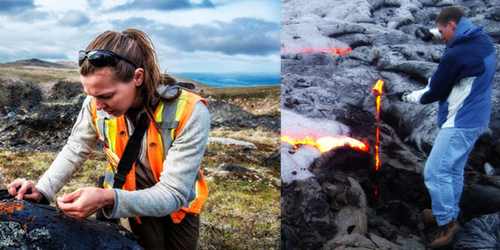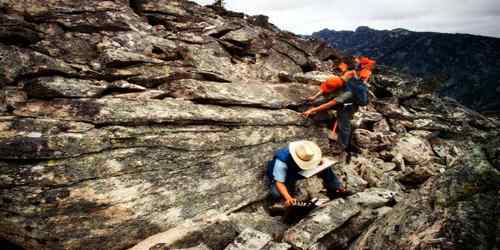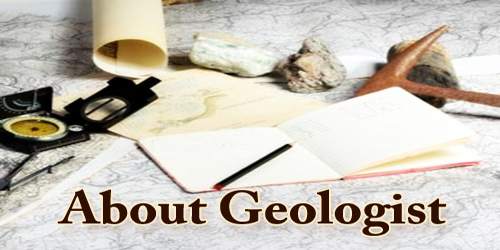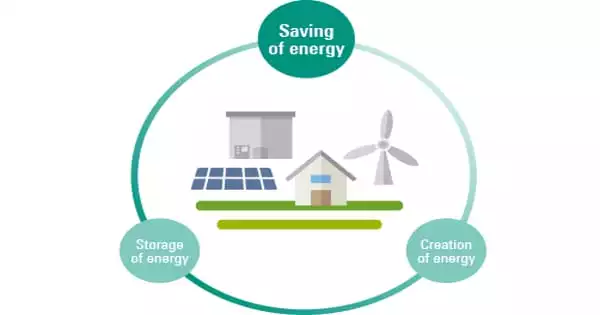A Geologist is a scientist who studies the earth processes such as earthquakes, landslides, floods, and volcanic eruptions to survey land and draw up safe building plans. Actually, a geologist is someone who works to understand the history of the planet we live on, to better predict the future and explain current occurrences. When geologists investigate earth materials, they not only investigate metals and minerals, but also look for oil, natural gas, water and methods to extract these. Geologists are also important contributors to climate change discussions.
Overall, geology is concerned with the changes of the earth over time, such as climate change and land formation. Geologists usually study geology, although backgrounds in physics, chemistry, biology, and other sciences are also useful. Fieldwork is an important component of geology, although many sub-disciplines incorporate laboratory work.
Geology is the study of the Earth, the materials of which it is made, the structure of those materials, and the processes acting upon them. It includes the study of organisms that have inhabited our planet. An important part of geology is the study of how Earth’s materials, structures, processes and organisms have changed over time.

History and Education of Geologists –
Geologic history provides a conceptual framework and overview of the evolution of the Earth. James Hutton is often viewed as the first modern geologist. In 1785 he presented a paper entitled Theory of the Earth to the Royal Society of Edinburgh. In his paper, he explained his theory that the Earth must be much older than had previously been supposed to allow enough time for mountains to be eroded and for sediments to form new rocks at the bottom of the sea, which in turn were raised up to become dry land. Hutton published a two-volume version of his ideas in 1795 (Vol. 1, Vol. 2). Followers of Hutton were known as Plutonists because they believed that some rocks were formed by vulcanism, which is the deposition of lava from volcanoes, as opposed to the Neptunists, led by Abraham Werner, who believed that all rocks had settled out of a large ocean whose level gradually dropped over time.
Early development of the subject was stratigraphy, the study of order and sequence in bedded sedimentary rocks. Stratigraphers still use the two main principles established by the late 18th-century English engineer and surveyor William Smith, regarded as the father of stratigraphy: (1) that younger beds rest upon older ones and (2) different sedimentary beds contain different and distinctive fossils, enabling beds with similar fossils to be correlated over large distances. Today biostratigraphy uses fossils to characterize successive intervals of geologic time, but as relatively precise time markers only to the beginning of the Cambrian Period, about 540,000,000 years ago. The geologic time scale, back to the oldest rocks, some 4,280,000,000 years ago, can be quantified by isotopic dating techniques. This is the science of geochronology, which in recent years has revolutionized scientific perception of Earth history and which relies heavily on the measured parent-to-daughter ratio of radiogenic isotopes.
Sir Charles Lyell first published his famous book, Principles of Geology, in 1830. This book, which influenced the thought of Charles Darwin, successfully promoted the doctrine of uniformitarianism. This theory states that slow geological processes have occurred throughout the Earth’s history and are still occurring today. In contrast, catastrophism is the theory that Earth’s features formed in single, catastrophic events and remained unchanged thereafter. Though Hutton believed in uniformitarianism, the idea was not widely accepted at the time.
For an aspiring geologist, training typically includes significant coursework in physics, mathematics, and chemistry, in addition to classes offered through the geology department; historical and physical geology, igneous and metamorphic petrology and petrography, hydrogeology, sedimentology, stratigraphy, mineralogy, palaeontology, physical geography, and structural geology are among the many required areas of study. Most geologists also need skills in GIS and other mapping techniques. Geologists may concentrate their studies or research in one or more of the following disciplines:
- Economic geology: the study of ore genesis, and the mechanisms of ore creation, geostatistics.
- Engineering geology: application of the geologic sciences to engineering practice for the purpose of assuring that the geologic factors affecting the location, design, construction, operation and maintenance of engineering works are recognized and adequately provided for;
- Geophysics: the applied branch deals with the application of physical methods such as gravity, seismicity, electricity, magnetic properties to study the earth.
- Geochemistry: the applied branch deals with the study of the chemical makeup and behavior of rocks, and the study of the behavior of their minerals.
- Geochronology: the study of isotope geology specifically toward determining the date within the past of rock formation, metamorphism, mineralization and geological events (notably, meteorite impacts).
- Geomorphology: the study of landforms and the processes that create them
- Hydrogeology: the study of the origin, occurrence, and movement of groundwater water in a subsurface geological system.
- Igneous petrology: the study of igneous processes such as igneous differentiation, fractional crystallization, intrusive and volcanological phenomena.
- Isotope geology: the case of the isotopic composition of rocks to determine the processes of rock and planetary formation.
- Metamorphic petrology: the study of the effects of metamorphism on minerals and rocks.
- Marine geology: the study of the seafloor; involves geophysical, geochemical, sedimentological and paleontological investigations of the ocean floor and coastal margins. Marine geology has strong ties to physical oceanography and plate tectonics.
- Palaeoclimatology: the application of geological science to determine the climatic conditions present in the Earth’s atmosphere within the Earth’s history.
- Palaeontology: the classification and taxonomy of fossils within the geological record and the construction of a palaeontological history of the Earth.
- Pedology: the study of soil, soil formation, and regolith formation.
- Petroleum geology: the study of sedimentary basins applied to the search for hydrocarbons (oil exploration).
- Planetary geology: the study of geology as it relates to other celestial bodies, namely planets and their moons. This includes the subdiscipline of lunar geology, selenology, and martian geology, areology.
- Sedimentology: the study of sedimentary rocks, strata, formations, eustasy and the processes of modern-day sedimentary and erosive systems.
- Seismology: The study of earthquakes.
- Structural geology: the study of folds, faults, foliation, and rock microstructure to determine the deformational history of rocks and regions.
- Volcanology: the study of volcanoes, their eruptions, lavas, magma processes, and hazards.
Career: Geology can be a very interesting and rewarding career. The minimum training required is a four-year college degree in geology. Geologists work in a variety of settings. These include – natural resource companies, environmental consulting companies, government agencies, non-profit organizations, and universities. Many geologists do fieldwork at least part of the time. Others spend their time in laboratories, classrooms or offices. All geologists prepare reports, do calculations and use computers.
Professional geologists work for a wide range of government agencies, private firms, and non-profit and academic institutions. They are usually hired on a contract basis or hold permanent positions within private firms or official agencies. Most geology graduates with a strong academic background and good grades have no trouble finding employment if they are willing to move to a location where work is available. Geologists in academia usually hold an advanced degree in a specialized area within their geological discipline and are employed by universities.

What does a Geologist do?
All divisions of geology provide highly useful information towards understanding the earth and its inhabitants. Depending on the particular specialization in geology, a geologist may study and map rock formations, collect rock samples and fossils, or measure the physical properties of the earth. This helps geologists interpret the active geological processes during the past several million years of earth’s history. Geology plays a vital role behind the success of many other different disciplines, such as climatology, civil engineering, and evolutionary biology.
A general geologist works with mineralogy, petrology, geological mapping, economic geology, and petroleum geology. Geological mapping consists of documenting geological formations on a map, such as rock patterns and distribution. The better they can understand Earth’s history, the better they can foresee how events and processes of the past might influence the future. Here are some examples:
- Geologists study Earth processes: Many processes such as landslides, earthquakes, floods, and volcanic eruptions can be hazardous to people. Geologists work to understand these processes well enough to avoid building important structures where they might be damaged. If geologists can prepare maps of areas that have flooded in the past, they can prepare maps of areas that might be flooded in the future. These maps can be used to guide the development of communities and determine where flood protection or flood insurance is needed.
- Geologists study Earth materials: People use Earth materials every day. They use oil that is produced from wells, metals that are produced from mines and water that has been drawn from streams or from underground. Geologists conduct studies that locate rocks that contain important metals, plan the mines that produce them and the methods used to remove the metals from the rocks. They do similar work to locate and produce oil, natural gas, and groundwater. The earth’s population is estimated to hit over 9 billion by 2050 more people means more natural resources will be needed. An economic geologist’s primary objective is to locate profitable deposits of oil, gas, and minerals and to figure out how to extract them. Economic geologists continue to successfully expand and define known mineral resources.
- Geologists study Earth history: Today we are concerned about climate change. Many geologists are working to learn about the past climates of Earth and how they have changed across time. This historical geology news information is valuable to understand how our current climate is changing and what the results might be.
Workplace of a Geologist –
Geologist’s works mainly in the field outdoors, but they can also do research within laboratories, classrooms, and offices. Since geology deals with much fieldwork, one should be able to adapt to weather changes and to varying terrains.
Geologists and geo-technologists work for mining companies or oil and gas exploration companies. They can also find work in civil engineering firms, planning city construction. Additionally, government agencies may need the aid of geologists to support geoscience, education, water affairs, and forestry.
Geologists are also in the forefront of preventing and mitigating damage from natural hazards and disasters such as earthquakes, volcanoes, tsunamis, and landslides. A geologist may also work with a variety of organizations over the span of their employment, such as non-profit organizations, universities and natural reserve companies, or work as a consultant.
Information Sources:
















